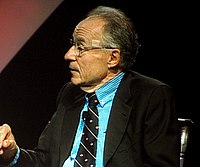Arno Allan Penzias
Arno Allan Penzias | |
|---|---|
 | |
| Born | April 26, 1933 |
| Nationality | American |
| Known for | Cosmic Microwave Background Radiation |
| Awards | File:Nobel.svg Nobel Prize in Physics (1978) |
| Scientific career | |
| Fields | Physics |
Arno Allan Penzias (born April 26, 1933) is an American physicist and a co-winner of the 1978 Nobel Prize in physics.
He was born in Munich, Germany. Aged six he fled to Britain as part of the Kindertransport. Six months later his parents also left Germany, and the family moved to the garment district of New York City in 1940. In 1946, he became a naturalized citizen of the United States. He graduated Brooklyn Technical High School in 1951 and received a bachelor's degree from the City College of New York in 1954. From Columbia University, he received his master's degree in 1958 and his Ph.D. in 1962.
He went on to work at Bell Labs in Holmdel, New Jersey where, with Robert Woodrow Wilson, he worked on ultra-sensitive cryogenic microwave receivers intended for radio astronomy observations. In 1964, on building their most sensitive antenna/receiver system, the pair encountered radio noise which they could not explain. It was far less energetic than the radiation given off by the Milky Way, and it was isotropic, so they assumed their instrument was subject to interference by terrestrial sources. They tried, and then rejected, the hypothesis that the radio noise emanated from New York City. An examination of the microwave horn antenna showed it was full of pigeon droppings (which Penzias described as "white dielectric material"). After the pair removed the guano buildup, and the pigeons were shot (each physicist says the other ordered the deed), the noise remained. Having rejected all sources of interference, the pair published a paper announcing their findings. This was later identified as the cosmic microwave background radiation (CMB), the radio remnant of the Big Bang. This allowed astronomers to confirm the Big Bang, and to correct many of their previous assumptions about it.
Penzias and Wilson received the 1978 Nobel Prize, sharing it with Pyotr Leonidovich Kapitsa (Kapitsa's work was unrelated to Penzias and Wilson's). The two had received the Henry Draper Medal the previous year.
Penzias currently serves as a venture partner at New Enterprise Associates.
See also
External links
- Penzias' biography
- Arno Penzias' home page at Bell Labs
- An article authored by Arno Penzias entitled Ideas
- American physicist stubs
- 1933 births
- Living people
- American astronomers
- Columbia University alumni
- Naturalized citizens of the United States
- Nobel laureates in Physics
- Members and associates of the United States National Academy of Sciences
- Jewish American scientists
- Scientists at Bell Labs
- City University of New York people
- People from Munich

